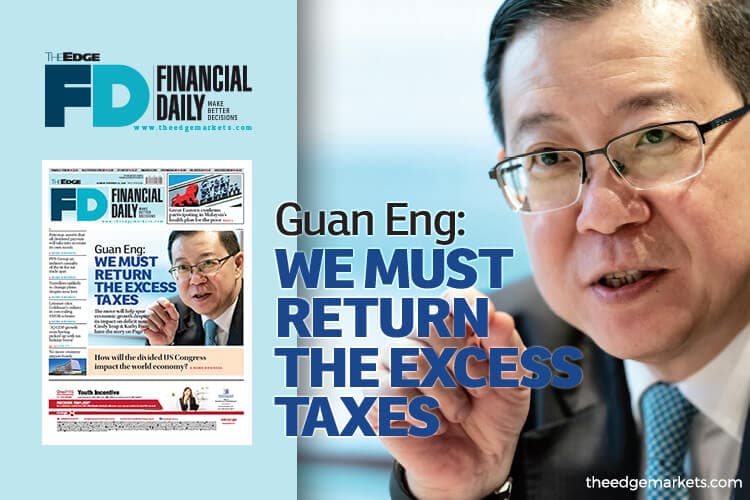
This article first appeared in The Edge Financial Daily on November 12, 2018
KUALA LUMPUR: Petroliam Nasional Bhd’s (Petronas) RM30 billion special dividend will help power Malaysia’s economy next year, but the all-time-high dividend payment does not make Malaysia heavily dependent on oil revenue, Finance Minister Lim Guan Eng said.
“Petronas can afford to pay that special dividend ... The special dividend is a one-off [event]. It is meant for the GST (goods and services tax) and income tax refunds. We have to return the money as soon as we can ... It is money that the government owes the taxpayers; otherwise, they could sue us ... it has been two years.
“And the tax refund would help spur economic growth ... this was understood by the rating agencies. At the end of the day, what is the point of Petronas having a lot of cash if the whole country collapses?” Guan Eng said to The Edge Financial Daily in an interview yesterday.
The RM37 billion outstanding amount is expected to be returned to taxpayers by end-2019, he said, noting that the government’s operating expenditure for 2019 would have been lower year-on-year if not for the need to return the excess taxes owed to the people and businesses by the previous administration.
Pointing to Moody’s Investors Service’s revision of Petronas’ outlook rating from “stable” to “negative” last week, critics — including former prime minister Datuk Seri Najib Razak — have taken to social media to criticise the current government’s purported inability to manage the country’s finances.
Some have also said the government is taking away money that Petronas could otherwise invest to sustain future growth. Others pointed to the smaller revenue collection from swapping the GST with the sales and services tax (SST) and reckoned Malaysia may have little choice but to keep tapping Petronas for more money, a move that is seen as unsustainable due to the volatility of oil prices.
Moody’s has noted that Petronas’ financial profile may deteriorate if the government continues to ask the national oil company to keep dividend payments high, especially should oil prices decline. Nonetheless, Moody’s affirmed Petronas’ “A1” rating.
The minister, who was once overwhelmed by the government’s depleted cash coffers when there was barely RM450 million left for the government’s cash flow, admitted that the government was concerned about the possibility of Malaysia’s sovereign rating being downgraded when it decided to run a wider deficit.
“Yes, we were worried. But we have to face it (fiscal problems). We should not run and should not hide [the problems]. We already decided on running a [wider] deficit even before the Mid-term Review [of the 11th Malaysia Plan].
“When the going gets tough, the tough gets going. We have to toughen up to face the reality that we need to clean up the legacy issues or the mess we inherited from the previous government,” said Guan Eng, who has had meetings with rating agencies.
“So far there isn’t any change [made by the rating agencies] after the announcement that the government is going to run a bigger deficit. Isn’t that positive?” said Guan Eng, adding that the meetings with rating agencies ended on positive notes but declined to elaborate further.
“You have to be fair to the government; they (rating agencies) also commented that institutional reforms are credit positive,” he added.
He also highlighted that Budget 2019 has spelt out details of the government’s plan to reduce the fiscal deficit to a healthier level and to restructure the national debts so that debt service charges would come down to more manageable levels.
Also, he pointed out that the government has already started to trim operating expenditure, which has accounted for 99% of the federal government revenue.
Guan Eng added that the government would remain prudent in its fiscal spending while trying to save as much as possible through open tender of all government contracts. “You would be surprised by how much you could save from open tenders. Penang has managed to save up [to] 45% ... Even if we only manage to save 10%, for a RM55 billion project, that will mean RM5.5 billion, which is a lot,” he explained.
He also highlighted that Budget 2019 emphasises on having the private sector as the locomotive to drive the domestic economy at a time the government has little money to stimulate growth. “When the economy grows, the government’s revenue will also increase.”
The country’s fiscal deficit is projected to be 3.7% of the gross domestic product for 2018, according to Budget 2019. The Pakatan Harapan government expects its fiscal consolidation efforts to narrow this deficit to 3.4% in 2019, 3% in 2020 and 2.8% in 2021.